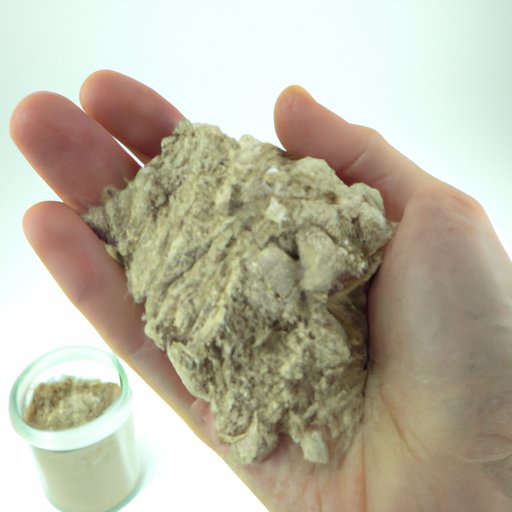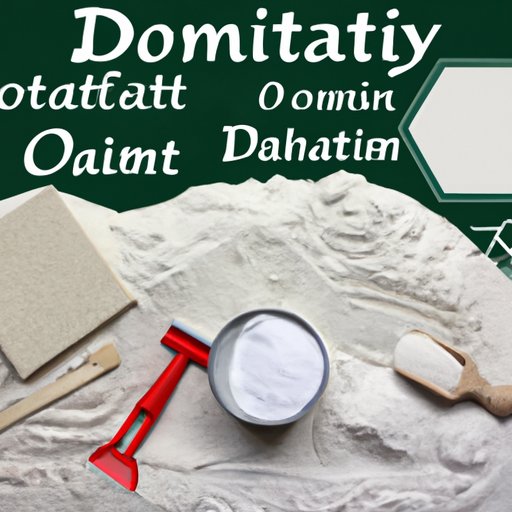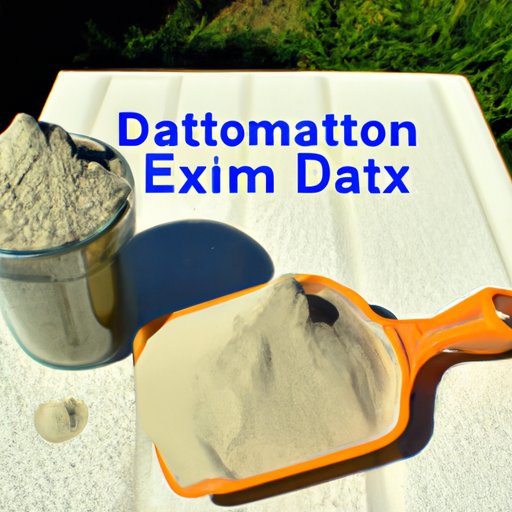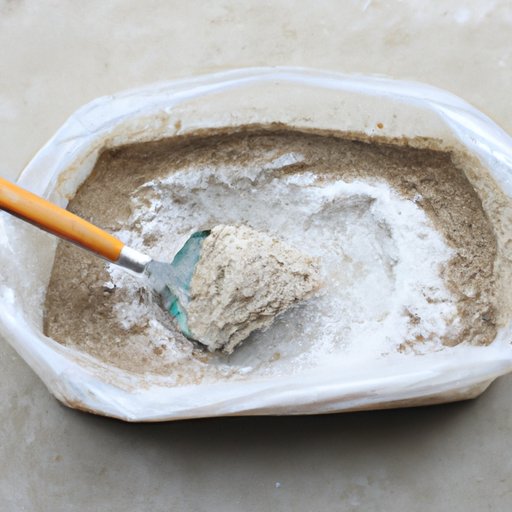Introduction
Diatomaceous earth (DE) is a sedimentary rock made from the fossilized remains of tiny aquatic organisms called diatoms. It’s naturally occurring and is mined from deposits across the world. While it may not sound like much, this seemingly innocuous powder has a multitude of uses and benefits. In this article, we’ll explore what diatomaceous earth is, the science behind it, and how you can use it in your home or garden.

Exploring the Benefits of Diatomaceous Earth
DE is a popular choice for natural pest control because it’s non-toxic to both humans and animals. It can also be used as a nutrient-rich soil additive that helps promote healthy plant growth. Let’s take a closer look at these benefits.
Natural Pest Control
DE is a powerful natural insecticide that kills pests on contact. According to the National Pesticide Information Center, it works by “scratching the waxy coating off the exoskeleton of insects and absorbing their body fluids. This causes them to die of dehydration.” Unlike chemical pesticides, DE doesn’t leave any long lasting residue and won’t damage the environment. It’s also safe to use around children and pets.
Nutrient-Rich Soil Additive
DE is rich in minerals like calcium, magnesium, and iron, which are essential for healthy plant growth. It can help improve soil structure and aeration, as well as increase water retention. Studies have shown that adding DE to soil can significantly improve crop yields. For example, a study published in the journal Agricultural Science found that adding DE to soil increased the yield of corn by up to 30 percent.
Non-Toxic to Humans and Animals
DE is considered non-toxic to humans and animals, making it a safe choice for natural pest control. It can be used indoors and outdoors without fear of harming people or pets. However, it should still be used with caution, as inhaling large amounts of DE can cause throat irritation and coughing.
How Does Diatomaceous Earth Work to Control Pests?
DE works by killing insects on contact. It’s effective against a wide range of pests, including ants, bed bugs, cockroaches, fleas, ticks, and spiders. The abrasive particles scratch away the protective waxy layer on the insect’s exoskeleton, causing them to dehydrate and die. It takes several days for the effects to take place, but once the pests are dead they won’t be able to reproduce.
Advantages Over Chemical Pesticides
Unlike chemical pesticides, DE won’t contaminate the ground or water supply. It’s safe to use indoors and outdoors, and won’t harm beneficial insects such as bees and ladybugs. Additionally, DE is relatively inexpensive and easy to apply. It can be scattered around the perimeter of a home or garden, or mixed into soil for effective pest control.
The Science Behind Diatomaceous Earth: A Closer Look
Now that we understand the basics of DE and its uses, let’s take a closer look at the science behind it.
What is Diatomaceous Earth Made Of?
DE is composed of the fossilized remains of diatoms, which are microscopic single-celled organisms that live in oceans and freshwater. They have hard shells, or “skeletons,” made of silica, which is a natural form of silicon dioxide. When these organisms die, their shells accumulate in the sediment at the bottom of bodies of water, forming deposits of DE over time.
How Does it Kill Pests?
DE works by scratching away the waxy protective layer on an insect’s exoskeleton and absorbing their body fluids. This causes the insect to dehydrate and die. According to a study published in the journal Environmental Entomology, DE “is effective in killing insects due to its abrasive nature and ability to absorb lipids from the cuticle of arthropods.”

An Overview of Diatomaceous Earth and Its Uses
DE has a variety of uses in the home and garden. It can be used as a natural pest control, soil additive, and for filtering water. Let’s take a look at some of the common uses for DE.
Common Uses in the Home and Garden
DE can be used to control a wide range of pests in the home and garden, including ants, bed bugs, cockroaches, fleas, ticks, and spiders. It can also be used as a soil additive to improve soil structure and nutrient levels. Additionally, DE can be used to filter water for drinking or swimming pools.
Other Uses Such as Filtering Water
DE can be used to filter water for drinking or swimming pools. It works by trapping impurities and removing them from the water. According to a study published in the journal Water Research, DE filtration is an effective way to remove microorganisms and other contaminants from water. It’s also a cost-effective alternative to chemical filtration systems.
Understanding the Different Grades of Diatomaceous Earth
When purchasing DE, it’s important to understand the different grades available. DE is classified as either food grade or industrial grade. Food grade DE is safe to use in the home and garden, while industrial grade is best used for industrial applications.
Food Grade vs. Industrial Grade
Food grade DE is safe for human and animal consumption, making it ideal for use in the home and garden. Industrial grade DE is not suitable for human or animal consumption and should only be used for industrial applications. When purchasing DE, make sure to check the label to ensure you’re getting the right type.
Different Particle Sizes
DE also comes in different particle sizes. Fine grade DE is best for dusting and sprinkling, while coarse grade is better suited for mixing into soil. The size of the particles will determine how effective the DE is at killing pests, so it’s important to choose the right size for the job.
The Pros and Cons of Using Diatomaceous Earth
DE is a versatile and powerful tool for controlling pests in the home and garden. However, it does have some drawbacks. Let’s take a look at the pros and cons of using DE.
Pros
- Non-toxic to humans and animals
- Safe to use indoors and outdoors
- Effective against a wide range of pests
- Inexpensive and easy to apply
- Can be used as a soil additive to improve soil structure and nutrient levels
- Can be used to filter water
Cons
- Inhaling large amounts can cause throat irritation and coughing
- It takes several days for the effects to take place
- Can be harmful to beneficial insects such as bees and ladybugs
- Not suitable for use in areas with high humidity or heavy rainfall

A Guide to Using Diatomaceous Earth for Your Home or Garden
Using DE in your home or garden is simple and straightforward. Here’s a step-by-step guide for applying DE for effective pest control.
Preparation
Before applying DE, make sure to wear protective clothing such as a face mask, goggles, and gloves. Also, keep pets and children away from the area until the DE has been applied and the dust has settled.
Application
Once you’re ready, sprinkle the DE around the perimeter of your home or garden. Make sure to cover the entire area, paying special attention to cracks and crevices where pests might hide. For best results, use a duster to apply the DE in thin layers.
Maintenance
DE needs to be reapplied every few weeks for best results. Keep an eye out for signs of pests and reapply the DE as soon as you notice them. Additionally, you should avoid watering the area for at least 48 hours after application to allow the DE to work.
Conclusion
Diatomaceous earth is a powerful and versatile tool for controlling pests in the home and garden. It’s non-toxic to humans and animals, and can be used as a soil additive to improve soil structure and nutrient levels. Additionally, it can be used to filter water for drinking or swimming pools. With proper use, DE can provide a safe and effective solution for pest control in the home and garden.
(Note: Is this article not meeting your expectations? Do you have knowledge or insights to share? Unlock new opportunities and expand your reach by joining our authors team. Click Registration to join us and share your expertise with our readers.)
